On November 20, 2024, the Chinese University of Hong Kong (CUHK) hosted a lecture by Fr. Prof. Cyril Hovorun, an internationally renowned scholar in ecclesiology, international relations, and ecumenism.
The lecture, titled “Political and Public Orthodox Theologies in the Modern Time,” attracted more than 30 scholars and students to Chung Chi College of CUHK. Moderated by Prof. Colten Yam of CUHK’s Divinity School, the event offered an in-depth exploration of the historical evolution and contemporary dynamics of Orthodox political and public theologies.
Fr. Hovorun, a Ukrainian professor in ecclesiology, international relations, and ecumenism from the University College Stockholm, began by outlining the distinctions between political theology and public theology. Political theology, he explained, focuses on the relationship between the church and the state, often critiquing or endorsing state power through theological reasoning. While political theology has historically been a force for unity, it has also been misapplied, such as during the rise of Nazism, when Carl Schmitt used it to justify authoritarianism. Public theology, on the other hand, focuses on the church’s engagement with society, emphasizing themes like social justice, reconciliation, and inclusion. Figures such as Martin Luther King Jr. were highlighted as examples of individuals whose work reflected public theology’s potential to address societal divisions.
Tracing the historical roots of Orthodox political theology, Fr. Hovorun referred to the fourth-century works of Eusebius of Caesarea, who aligned the church closely with Emperor Constantine’s authority. This model of church-state unity has influenced Orthodox thought in various contexts, including the close relationship between the Russian Orthodox Church and state authorities. By contrast, he explained, alternative approaches emphasize decentralization and greater engagement with civil society. He pointed to theological and societal shifts during significant historical moments, such as Ukraine’s 2014 Revolution of Dignity, as examples of how these dynamics have evolved in modern times.
The lecture also addressed the concepts of civil religion and political religion. Civil religion, as defined by Jean-Jacques Rousseau, functions as a unifying societal force independent of institutional churches, providing shared values and symbols for a community. Fr. Hovorun referenced American civil religion, where figures like George Washington and Abraham Lincoln, alongside foundational texts like the Constitution, serve as symbols of national unity. In contrast, political religion involves a more coercive use of religious-like devotion to enforce political ideologies. Examples included Nazi Germany, where Adolf Hitler was elevated to a messianic figure, and the Soviet Union, where Marxism-Leninism assumed a quasi-religious role. Fr. Hovorun underscored the risks of political religion, noting its exclusionary and authoritarian tendencies while contrasting it with the voluntary and inclusive nature of civil religion.
In his conclusion, Fr. Hovorun reflected on the role of theology in modern conflicts and societal responses. He observed that wars often arise from a combination of material and ideological factors, with theology sometimes invoked to support political narratives. From historical conflicts in the Balkans to more recent tensions in Eastern Europe, he noted how theological ideas have been used in various ways. At the same time, he emphasized theology’s capacity to promote social cohesion and reconciliation when applied in ways that prioritize the common good.
During the Q&A session, Fr. Hovorun addressed questions about the persistence of religion in post-Soviet societies, highlighting its adaptability in responding to societal needs despite historical suppression. He also discussed the concept of political religion in different contexts, such as Turkmenistan’s cult of personality, and contrasted this with examples from other regions, including Georgia and the Baltic states.












